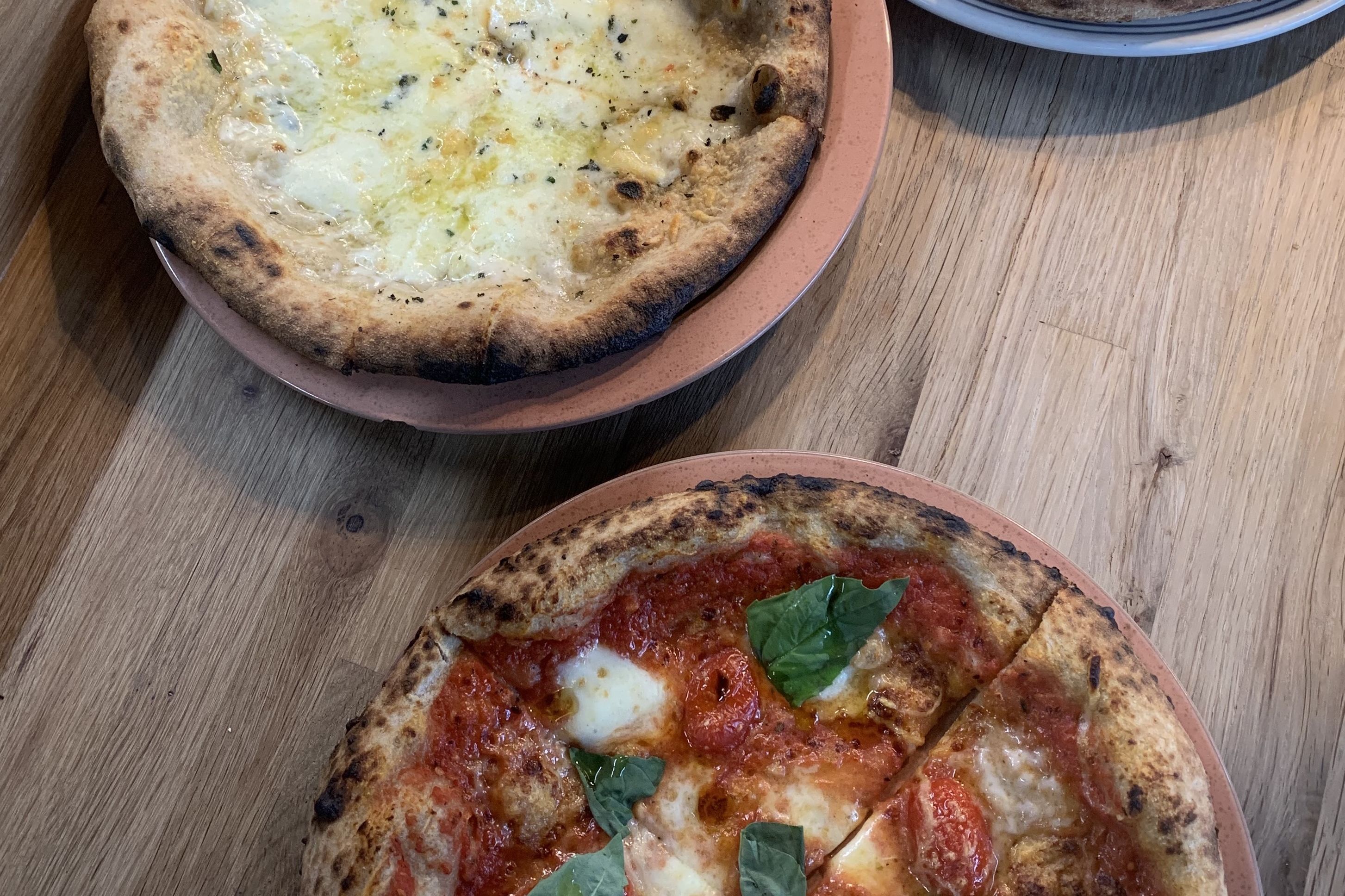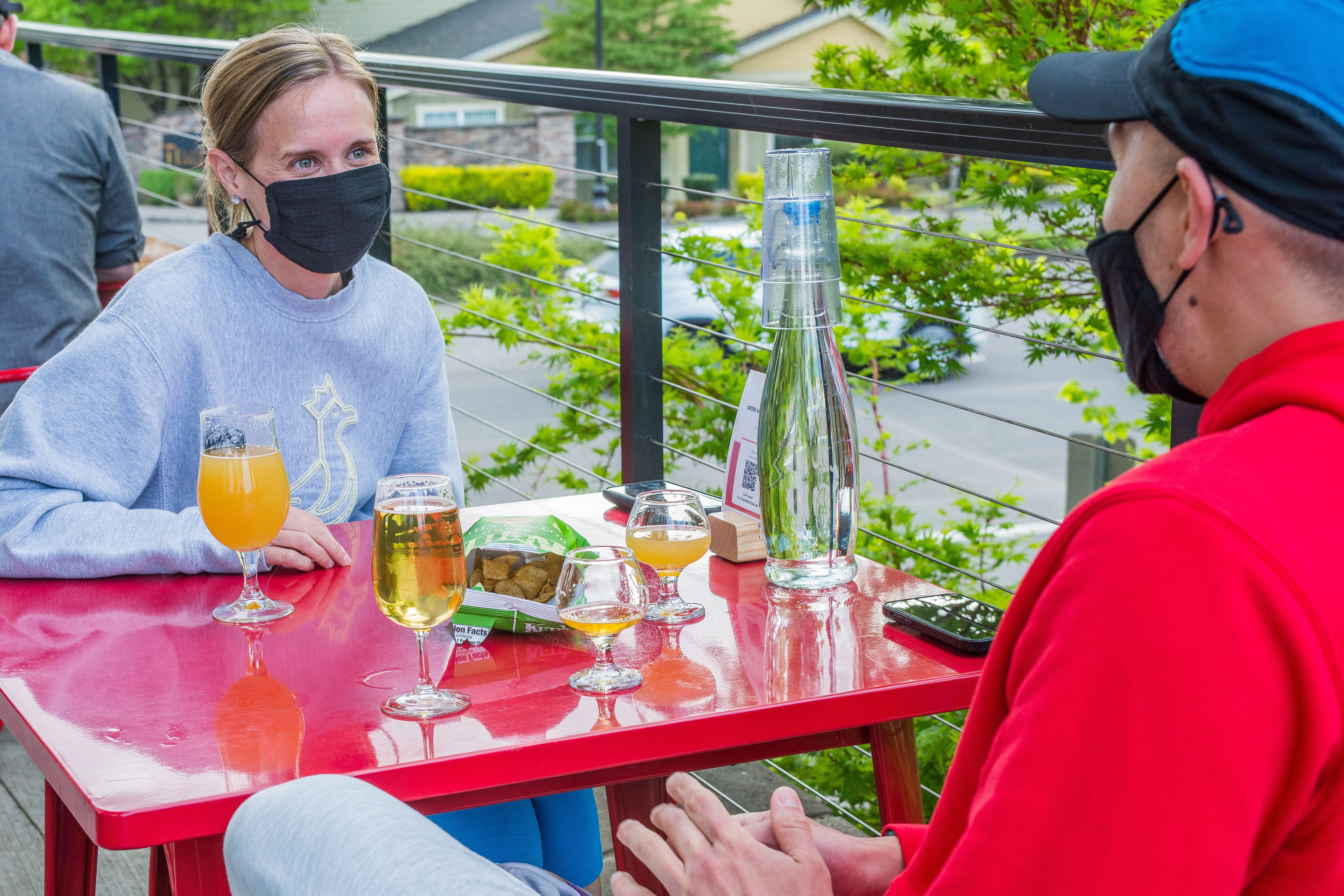The Culinary Case for Beaverton

Image: Thomas Teal
There's a stretch of Watson Avenue, between the train tracks and Beaverton City Park, that behaves as the suburb’s restaurant row. Mornings begin at Lionheart Coffee, baristas pouring oat milk hearts and greeting regulars by name. Downtown workers grab cafecitos and guava-filled pastelitos at La Floridita and gather at Nak Won for elastic japchae noodles. Happy hour roars to the north. Pints clink at beer bar Loyal Legion, and bartenders rattle pisco sours at vegan cocktail bar June. At 1st Street Dining Commons, a cordoned-off block turned communal outdoor dining plaza, a fleet of surrounding restaurants supply
orders of Korean fried chicken, salmon nigiri, and hazelnut tantanmen ramen. And this is only the red-hot center of a booming scene. Just a few blocks away: Burmese tea leaf salad, handmade pasta, Chicago tavern–style pizza.

Image: Thomas Teal
It’s the kind of energy, liveliness, and culinary diversity expected in a much larger city, like Portland. But with just under 100,000 residents, this western suburb is giving its bigger sibling a run for its money. Beaverton, similar to its neighbors Tigard and Hillsboro, has attracted high-profile international chains like Happy Lamb and Kura Sushi ahead of Portland proper. Shake Shack’s first Oregon location opened in Cedar Hills Crossing, and, just across the city line in Tigard, Washington Square was the landing pad for Oregon’s first Din Tai Fung, a dumpling palace with a Michelin-starred location in Hong Kong. Portland restaurateurs have noticed the attention and done the same, opening Beaverton outposts of Breakside Brewing, Lazy Days Brewing, Farmer and the Beast, Loyal Legion, Pho Oregon, and Top Burmese, to name just a few.

Image: Thomas Teal
If you live in Portland, braving US 26’s glacial crawl for dinner when our home turf brims with options is a tough sell. Then again, you simply won’t find the same bubbling cauldrons of Korean jjigaes, meticulously dry-aged sushi, soursop-scented Mexican nieves, and gargantuan mounds of mofongo within city limits. And don’t think you’ll be discovering some quiet hidden gem: Locals keep their restaurants lively every night of the week.
The communities west of Portland have long been a haven for cuisines underrepresented in the city. Washington County is home to the largest Asian American population in the state, and for years, it was the place for Asian groceries: Uwajimaya for shokupan and barbecue pork buns; G Mart for kimchi and tteokbokki. South Asian markets like Apna Bazaar provided Diwali supplies and pantry staples, followed by a restorative post-shopping thali. Similarly, a few legacy restaurants paved the way for the current scene. In the late 1990s, Tân Tân Deli began serving banh mi and noodle soups with housemade Vietnamese sausages and hams, a rarity in the area. Nak Won has been slinging seafood pancakes and soondubu just as long. And regional Chinese cuisines have held ground in Beaverton for well over a decade, from stir-fried intestines and dry-cooked frog at Taste of Sichuan (still closed at press time after a December 2023 fire) to the rolling dim sum carts at Chinatown Restaurant.

Image: Thomas Teal
Today, these restaurants ground a new generation—steps from Nak Won is 1st Street Pocha and the Korean fried chicken that earned it a place on our 50 Best Restaurants list. Beaverton’s selection of geographically specific Chinese cuisines now covers dishes from Gansu, Yunnan, and Inner Mongolia. And Tân Tân is far from the only one in town ladling bowls of bún bò Huế.
Instagram and TikTok personality Yvette Chau has seen the evolution firsthand. She grew up in Corvallis but would visit her aunts in Beaverton, eating at standbys like Always Spring or the now-closed DJK Korean BBQ at a time when very few Oregon cities had even one Korean place. Chau moved to the suburb in 2019, and within a few years started her TikTok, @yvetteciao, to highlight not just Portland’s businesses, but Beaverton’s, covering new openings ahead of most food journalists. She was early to Coredam, known for its spicy raw marinated crab, and Hansik, the buzzy ssam spot on SW Apple Way. Social media platforms have been instrumental in driving new audiences to Beaverton restaurants: The Korean Mama, a cheery, nationally famous food influencer with 500,000 Instagram followers and counting, has posted videos sampling the kimchi at the city’s Korean barbecue joints and stirring a bowl of jajangmyeon at One Korean Restaurant. “I’ve seen a bunch of Korean restaurants pop up within the last year or two,” Chau says. “I always call Beaverton a mini-K-Town.”

Image: Thomas Teal
Kurt Huffman, whose restaurant group ChefStable includes Latin American steakhouse Ox and sandwich shop Lardo, grew up in Portland, and he’s had a hard time shaking his old vision of the suburb. “Beaverton was where all the car dealerships were,” he says. “People who lived in Beaverton said they lived in Portland.” He toyed with the idea of opening something there for the better part of a decade, but it wasn’t until he passed on the space that eventually became Ate-Oh-Ate, and watched it succeed so far west, that he decided to set up shop in the suburb. Opened in 2021, his Loyal Legion satellite serves as the Cheers of Watson Avenue; in its first year, it did double the business of its Portland counterpart.
Beaverton’s booming food scene isn’t simply organic: The city has made a deliberate effort to bring restaurant owners to its center by offering grants for new developments and building improvements, and property tax abatements for those opening in “enterprise zones”—neighborhoods the city has targeted for development. Loyal Legion’s success inspired Huffman to open a Beaverton location of ChefStable’s Latin American bakery, Dos Hermanos, just across the train tracks, and he says he has plans to expand into Cedar Hills Crossing. “You have to give a lot of credit to Beaverton,” Huffman says. “The City of Beaverton also had to believe that they had the people behind [their initiatives] to keep it going, to fill the restaurants.”

Image: thomas teal
Less expansion-eyed types seeking a locale for a dream project have also appreciated what Beaverton can offer: an eager dining public, relatively low rent, and a not-yet-oversaturated market. Don Salamone and Kate Laurents shut down their growing fleet of Burger Stevens food carts to open a 1970s den called Don’s Favorite Foods in 2023. The Italian tasting menu destination is unlike anything in Beaverton: Popovers with trout roe and caviar precede crab manicotti and lobster-studded spaghetti. Past meals have involved things like uni and veal. The dining room is shockingly tiny—we’re talking 20 seats—which is exactly how Salamone and Laurents like it.
The couple live in Hillsdale, in the middle ground between Portland proper and the burbs, so they knew how difficult it could be to find something celebration-worthy west of downtown. Despite the steeper price tag and tasting menu model, Don’s has become a reliable splurge for anniversaries and date nights, though the restaurant also has monthly regulars who nab reservations every time the menu shifts. “In the first few months, every table was like, ‘Thank you so much for opening in Beaverton,’” Laurents says.
To say Beaverton is a fully developed culinary hot spot is not quite correct—not yet. There are still some visible gaps; few restaurants hold the polished sheen of an established aesthetic or brand strategy. But Beaverton restaurants don’t need to nail the sexy lighting or tout signature Maak Lab scents to fill seats. It’s an evolving scene to watch, one with an enthusiasm and unrehearsed charm reminiscent of Portland in the early aughts. Those who are serious about food should be eating their way through the suburbs, whether that’s home or on the other side of a rush hour slog.




